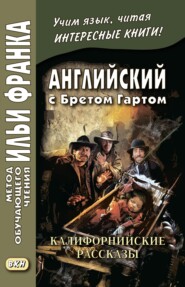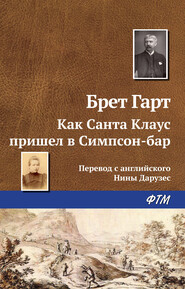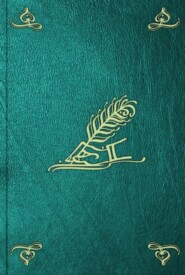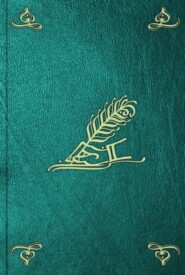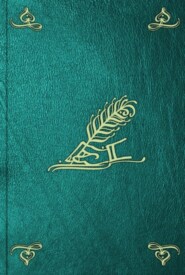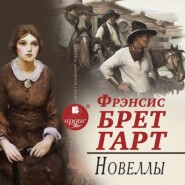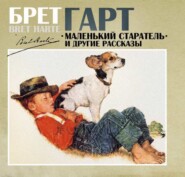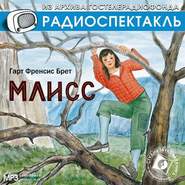По всем вопросам обращайтесь на: info@litportal.ru
(©) 2003-2024.
✖
Gabriel Conroy
Автор
Год написания книги
2017
Настройки чтения
Размер шрифта
Высота строк
Поля
"Pete," interrupted Mr. Hamlin, languidly, "is a good nigger. I shouldn't like to lose him! Perhaps you're right – maybe I am a little over-cautious. But when a man has lost two servants by gunshot wounds inside of three months, it makes him careful."
The perfect unconcern of the speaker, the reticence of his companion, and the dead silence of the room in which this extraordinary speech was uttered, filled the measure of Mr. Raynor's astonishment.
"Bless my soul! this is most extraordinary. I have seen nothing of this," he said, appealing in dumb show to his companion.
Mr. Hamlin followed the direction of his eyes. "Your friend is a Californian and knows what we think of any man who lies, and how most men resent such an imputation, and I reckon he'll endorse me!"
The editor muttered a hasty assent that seemed to cover Mr. Hamlin's various propositions, and then hurriedly withdrew, abandoning his charge to Mr. Hamlin. What advantage Jack took of this situation, what extravagant accounts he gravely offered of the vegetation in Lower California, of the resources of the country, of the reckless disregard of life and property, do not strictly belong to the record of this veracious chronicle. Notwithstanding all this, Mr. Raynor found Mr. Hamlin an exceedingly fascinating companion, and later, when the editor had rejoined them, and Mr. Hamlin proceeded to beg that gentleman to warn Mr. Raynor against gambling as the one seductive, besetting sin of California, alleging that it had been the ruin of both the editor and himself, the tourist was so struck with the frankness and high moral principle of his new acquaintance as to insist upon his making one of their party, an invitation that Mr. Hamlin might have accepted but for the intervention of a singular occurrence.
During the conversation he had been curiously impressed by the appearance of a stranger who had entered and modestly and diffidently taken a seat near the door. To Mr. Hamlin this modesty and diffidence appeared so curiously at variance with his superb physique, and the exceptional strength and power shown in every muscle of his body, that with his usual audacity he felt inclined to go forward and inquire "what was his little game?" That he was lying in wait to be "picked up" – the reader must really excuse me if I continue to borrow Mr. Hamlin's expressive vernacular – that his diffidence and shyness was a deceit and intended to entrap the unwary, he felt satisfied, and was proportionably thrilled with a sense of admiration for him. That a rational human being who held such a hand should be content with a small ante, without "raising the other players," – but I beg the fastidious reader's forgiveness.
He was dressed in the ordinary miner's garb of the Southern mines, perhaps a little more cleanly than the average miner by reason of his taste, certainly more picturesque by reason of his statuesque shapeliness. He wore a pair of white duck trousers, a jumper or loose blouse of the same material, with a low-folded sailor's collar and sailor-knotted neckerchief, which displayed, with an unconsciousness quite characteristic of the man, the full, muscular column of his sunburnt throat, except where it was hidden by a full, tawny beard. His long, sandy curls fell naturally and equally on either side of the centre of his low, broad forehead. His fair complexion, although greatly tanned by exposure, seemed to have faded lately as by sickness or great mental distress, a theory that had some confirmation in the fact that he ate but little. His eyes were downcast, or, when raised, were so shy as to avoid critical examination. Nevertheless his mere superficial exterior was so striking as to attract the admiration of others besides Mr. Hamlin; to excite the enthusiastic attention of Mr. Raynor, and to enable the editor to offer him as a fair type of the mining population. Embarrassed at last by a scrutiny that asserted itself even through his habitual unconsciousness and pre-occupation, the subject of this criticism arose and returned to the hotel verandah, where his pack and mining implements were lying. Mr. Hamlin, who for the last few days had been in a rather exceptional mood, for some occult reason which he could not explain, felt like respecting the stranger's reserve, and quietly lounged into the billiard-room to wait for the coming of the stage-coach. As soon as his back was turned the editor took occasion to offer Mr. Raynor his own estimate of Mr. Hamlin's character and reputation, to correct his misstatements regarding Californian resources and social habits, and to restore Mr. Raynor's possibly shaken faith in California as a country especially adapted to the secure investment of capital.
"As to the insecurity of life," said the editor, indignantly, "it is as safe here as in New York or Boston. We admit that in the early days the country was cursed by too many adventurers of the type of this very gambler Hamlin, but I will venture to say that you will require no better refutation of these calumnies than this very miner whom you admired. He, sir, is a type of our mining population; strong, manly, honest, unassuming, and perfectly gentle and retiring. We are proud, sir, we admit, of such men – eh? Oh, that's nothing – only the arrival of the up-stage!"
It certainly was something more. A momentarily increasing crowd of breathless men were gathered on the verandah before the window and were peering anxiously over each other's head toward a central group, among which towered the tall figure of the very miner of whom they had been speaking. More than that, there was a certain undefined, restless terror in the air, as when the intense conscious passion or suffering of one or two men communicates itself vaguely without speech, sometimes even without visible sign to others. And then Yuba Bill, the driver of the Wingdam coach, strode out from the crowd into the bar-room, drawing from his hands with an evident effort his immense buckskin gloves.
"What's the row, Bill?" said half-a-dozen voices.
"Nothin'," said Bill, gruffly; "only the Sheriff of Calaveras ez kem down with us hez nabbed his man jest in his very tracks."
"When, Bill?"
"Right yer – on this very verandy – furst man he seed!"
"What for?" "Who?" "What hed he bin doin'?" "Who is it?" "What's up?" persisted the chorus.
"Killed a man up at One Horse Gulch, last night," said Bill, grasping the decanter which the attentive bar-keeper had, without previous request, placed before him.
"Who did he kill, Bill?"
"A little Mexican from 'Frisco by the name o' Ramirez."
"What's the man's name that killed him – the man that you took?"
The voice was Jack Hamlin's.
Yuba Bill instantly turned, put down his glass, wiped his mouth with his sleeve, and then deliberately held out his great hand with an exhaustive grin. "Dern my skin, ole man, if it ain't you! And how's things, eh? Yer lookin' a little white in the gills, but peart and sassy, ez usual. Heerd you was kinder off colour, down in Sacramento lass week. And it's you, ole fell, and jest in time! Bar-keep – hist that pizen over to Jack. Here to ye agin, ole man! But I'm glad to see ye!"
The crowd hung breathless over the two men – awestruck and respectful. It was a meeting of the gods – Jack Hamlin and Yuba Bill. None dare speak. Hamlin broke the silence at last, and put down his glass.
"What," he asked, lazily, yet with a slight colour on his cheek, "did you say was the name of the chap that fetched that little Mexican?"
"Gabriel Conroy," said Bill.
CHAPTER II.
MR. HAMLIN TAKES A HAND
The capture had been effected quietly. To the evident astonishment of his captor, Gabriel had offered no resistance, but had yielded himself up with a certain composed willingness, as if it were only the preliminary step to the quicker solution of a problem that was sure to be solved. It was observed, however, that he showed a degree of caution that was new to him – asking to see the warrant, the particulars of the discovery of the body, and utterly withholding that voluble explanation or apology which all who knew his character confidently expected him to give, whether guilty or innocent – a caution which, accepted by them as simply the low cunning of the criminal, told against him. He submitted quietly to a search that, however, disclosed no concealed weapon or anything of import. But when a pair of handcuffs were shown him, he changed colour, and those that were nearest to him saw that he breathed hurriedly, and hesitated in the first words of some protest that rose to his lips. The sheriff, a man of known intrepidity, who had the rapid and clear intuition that comes with courageous self-possession noticed it also, and quietly put the handcuffs back in his pocket.
"I reckon there's no use for 'em here; ef you're willin' to take the risks, I am."
The eyes of the two men met, and Gabriel thanked him. In that look he recognised and accepted the fact that on a motion to escape he would be instantly killed.
They were to return with the next stage, and in the interval Gabriel was placed in an upper room, and securely guarded. Here, falling into his old apologetic manner, he asked permission to smoke a pipe, which was at once granted by his good-humoured guard, and then threw himself at full length upon the bed. The rising wind rattled the windows noisily, and entering tossed the smoke-wreaths that rose from his pipe in fitful waves about the room. The guard, who was much more embarrassed than his charge, was relieved of an ineffectual attempt to carry on a conversation suitable to the occasion by Gabriel's simple directness —
"You needn't put yourself out to pass the time o' day with me," he said, gently, "that bein' extry to your reg'lar work. Ef you hev any friends ez you'd like to talk to in your own line, invite 'em in, and don't mind me."
But here the guard's embarrassment was further relieved by the entrance of Joe Hall, the sheriff.
"There's a gentleman here to speak with you," he said to Gabriel, "he can stay until we're ready to go." Turning to the guard, he added, "You can take a chair outside the door in the hall. It's all right, it's the prisoner's counsel."
At the word Gabriel looked up. Following the sheriff, Lawyer Maxwell entered the room. He approached Gabriel, and extended with grave cordiality a hand that had apparently wiped from his mouth the last trace of mirthfulness at the door.
"I did not expect to see you again so soon, Gabriel, but as quickly as the news reached me, and I heard that our friend Hall had a warrant for you, I started after him. I would have got here before him, but my horse gave out." He paused, and looked steadily at Gabriel. "Well!"
Gabriel looked at him in return, but did not speak.
"I supposed you would need professional aid," he went on, with a slight hesitation, "perhaps mine– knowing that I was aware of some of the circumstances that preceded this affair."
"Wot circumstances?" asked Gabriel, with the sudden look of cunning that had before prejudiced his captors.
"For Heaven's sake, Gabriel," said Maxwell, rising with a gesture of impatience, "don't let us repeat the blunder of our first interview. This is a serious matter; may be very serious to you. Think a moment. Yesterday you sought my professional aid to deed to your wife all your property, telling me that you were going away never to return to One Horse Gulch. I do not ask you now why you did it. I only want you to reflect that I am just now the only man who knows that circumstance – a circumstance that I can tell you as a lawyer is somewhat important in the light of the crime that you are now charged with."
Maxwell waited for Gabriel to speak, wiping away as he waited the usual smile that lingered around his lips. But Gabriel said nothing.
"Gabriel Conroy," said Lawyer Maxwell, suddenly dropping into the vernacular of One Horse Gulch, "are you a fool?"
"Thet's so," said Gabriel, with the simplicity of a man admitting a self-evident proposition, "Thet's so; I reckon I are."
"I shouldn't wonder," said Maxwell, again swiftly turning upon him, "if you were!" He stopped, as if ashamed of his abruptness, and said more quietly and persuasively, "Come, Gabriel, if you won't confess to me, I suppose that I must to you. Six months ago I thought you an impostor. Six months ago the woman who is now your wife charged you with being an impostor; with assuming a name and right that did not belong to you; in plain English, said that you had set yourself up as Gabriel Conroy, and that she, who was Grace Conroy, the sister of the real Gabriel, knew that you lied. She substantiated all this by proofs; hang it," continued Maxwell, appealing in dumb show to the walls, "there isn't a lawyer living as wouldn't have said it was a good case, and been ready to push it in any court. Under these circumstances I sought you, and you remember how. You know the result of that interview. I can tell you now that if there ever was a man who palpably confessed to guilt when he was innocent, you were that man. Well, after your conduct there was explained by Olly, without, however, damaging the original evidence against you, or prejudicing her rights, this woman came to me and said that she had discovered that you were the man who had saved her life at the risk of your own, and that for the present she could not, in delicacy, push her claim. When afterwards she told me that this gratitude had – well, ripened into something more serious, and that she had engaged herself to marry you, and so condone your offence, why, it was woman-like and natural, and I suspected nothing. I believed her story – believed she had a case. Yes, sir; the last six months I have looked upon you as the creature of that woman's foolish magnanimity. I could see that she was soft on you, and believed that you had fooled her. I did, hang me! There, if you confess to being a fool, I do to having been an infernal sight bigger one."
He stopped, erased the mirthful past with his hand, and went on —
"I began to suspect something when you came to me yesterday with this story of your going away, and this disposal of your property. When I heard of the murder of this stranger – one of your wife's witnesses to her claim – near your house, your own flight, and the sudden disappearance of your wife, my suspicions were strengthened. And when I read this note from your wife, delivered to you last night by one of her servants, and picked up early this morning near the body, my suspicions were confirmed."
As he finished he took from his pocket a folded paper and handed it to Gabriel. He received it mechanically, and opened it. It was his wife's note of the preceding night. He took out his knife, still holding the letter, and with its blade began stirring the bowl of his pipe. Then after a pause, he asked cautiously —
"And how did ye come by this yer?"
"It was found by Sal Clark, brought to Mrs. Markle, and given to me. Its existence is known only to three people, and they are your friends."
There was another pause, in which Gabriel deliberately stirred the contents of his pipe. Mr. Maxwell examined him curiously.
"Well," he said, at last, "what is your defence?"
Gabriel sat up on the bed and rapped the bowl of his pipe against the bedpost to loosen some refractory encrustation.







